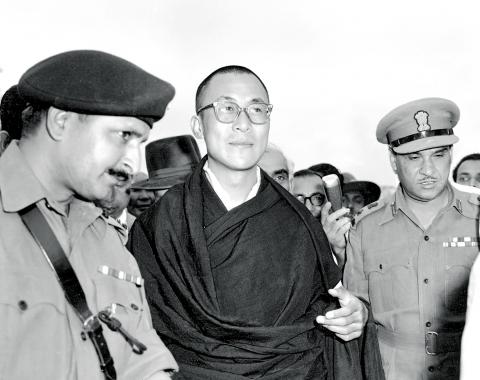It may have been six decades since the Dalai Lama fled into exile, but in the isolated mountain hamlet where he was born, he remains very much on the minds of devotees and Chinese authorities alike.
On the northeastern edge of the Tibetan plateau, Taktser, in Qinghai Province, where the Dalai Lama was born in 1935 to parents who farmed buckwheat and barley, is a magnet to worshipers and foreign tourists — and security personnel.
During a recent Reuters visit to Taktser, known in Chinese as Hongya, police armed with automatic weapons blocked the winding road leading into the village of some 60 houses.

Photo: AP
Police and more than a dozen plain-clothed officials who declined to identify themselves refused Reuters entry, saying the village was private and not open to the public.
The Qinghai government and China’s State Council Information Office, which doubles as the Communist Party’s spokesman’s office, did not respond to requests for comment.
Beijing views the Nobel Peace Prize laureate as a dangerous separatist and has denounced the 83-year-old spiritual leader as a “wolf in monk’s robes.” The Dalai Lama denies espousing violence and says he only wants genuine autonomy for Tibet.
Many of China’s more than 6 million Tibetans still venerate the Dalai Lama, despite government prohibitions on displays of his picture or any public display of devotion.
This Sunday marks 60 years since the Dalai Lama, disguised as a soldier, fled the Potala Palace in Lhasa, the Tibetan capital, after rumors that Chinese troops were planning his abduction or assassination fomented an abortive popular uprising.
The Dalai Lama crossed into India two weeks later, and has not set foot in Tibet since.
Despite the passage of time, during sensitive political anniversaries China’s security apparatus routinely restricts access to the village where the Dalai Lama’s old family is located, behind a pair of wooden doors and high concrete walls.
‘IN YOUR HEART’
One 29-year-old Tibetan man in the largely ethnic Tibetan town of Rebkong, set in a precipitous valley in Qinghai with a large monastery adorned in rich colors, enthusiastically recounted his pilgrimage to Taktser years ago.
He said Tibetans were well aware of the upcoming 60th anniversary of the Dalai Lama’s exile, even if public commemorations of any sort were banned.
“You can only bury it in your heart, we just don’t speak about it,” he said, declining to be identified due to the sensitivity of the matter.
“We have no ability to go against politics, we can only just go with society.”
Born Lhamo Thondup, the Dalai Lama was just two years old when identified by a search party as the new incarnation of Tibet’s most important spiritual leader, and was whisked from the family home to live in Lhasa.
The anniversary of his escape over the mountains into exile in India is one of several politically sensitive dates in China this year, including the 30th anniversary of the crackdown on pro-democracy demonstrators in Tiananmen Square in June, that the ruling Communist Party wants to ensure passes without controversy.
Speaking on the sidelines of China’s annual meeting of parliament this month, Tibet’s Communist Party chief Wu Yingjie (吳英杰) said the Tibetan people felt greater affection toward the government than the Dalai Lama, who “hasn’t done a single good thing for the people of Tibet.”
As the Dalai Lama ages, many Tibetans fear that Beijing will simply appoint its own replacement.
The Dalai Lama has suggested that his incarnation might be found outside Chinese-controlled territory, or that the centuries-old Dalai Lama institution could die with him.

June 2 to June 8 Taiwan’s woodcutters believe that if they see even one speck of red in their cooked rice, no matter how small, an accident is going to happen. Peng Chin-tian (彭錦田) swears that this has proven to be true at every stop during his decades-long career in the logging industry. Along with mining, timber harvesting was once considered the most dangerous profession in Taiwan. Not only were mishaps common during all stages of processing, it was difficult to transport the injured to get medical treatment. Many died during the arduous journey. Peng recounts some of his accidents in

“Why does Taiwan identity decline?”a group of researchers lead by University of Nevada political scientist Austin Wang (王宏恩) asked in a recent paper. After all, it is not difficult to explain the rise in Taiwanese identity after the early 1990s. But no model predicted its decline during the 2016-2018 period, they say. After testing various alternative explanations, Wang et al argue that the fall-off in Taiwanese identity during that period is related to voter hedging based on the performance of the Democratic Progressive Party (DPP). Since the DPP is perceived as the guardian of Taiwan identity, when it performs well,

The Taiwan People’s Party (TPP) on May 18 held a rally in Taichung to mark the anniversary of President William Lai’s (賴清德) inauguration on May 20. The title of the rally could be loosely translated to “May 18 recall fraudulent goods” (518退貨ㄌㄨㄚˋ!). Unlike in English, where the terms are the same, “recall” (退貨) in this context refers to product recalls due to damaged, defective or fraudulent merchandise, not the political recalls (罷免) currently dominating the headlines. I attended the rally to determine if the impression was correct that the TPP under party Chairman Huang Kuo-Chang (黃國昌) had little of a

At Computex 2025, Nvidia CEO Jensen Huang (黃仁勳) urged the government to subsidize AI. “All schools in Taiwan must integrate AI into their curricula,” he declared. A few months earlier, he said, “If I were a student today, I’d immediately start using tools like ChatGPT, Gemini Pro and Grok to learn, write and accelerate my thinking.” Huang sees the AI-bullet train leaving the station. And as one of its drivers, he’s worried about youth not getting on board — bad for their careers, and bad for his workforce. As a semiconductor supply-chain powerhouse and AI hub wannabe, Taiwan is seeing